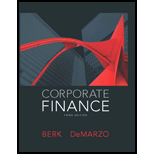
Corporate Finance
3rd Edition
ISBN: 9780132992473
Author: Jonathan Berk, Peter DeMarzo
Publisher: Prentice Hall
expand_more
expand_more
format_list_bulleted
Concept explainers
Question
Chapter 12.4, Problem 2CC
Summary Introduction
To discuss: The two methods for estimating a firm’s debt cost of capital.
Introduction:
Cost of capital refers to the return that the investors expect on a particular investment. In other words, it refers to the compensation demanded by the investors for using their capital.
Expert Solution & Answer
Want to see the full answer?
Check out a sample textbook solution
Students have asked these similar questions
Esfandairi Enterprises is considering a new three-year expansion project
that requires an initial fixed asset investment of $2,350,000. The fixed
asset will be depreciated straight-line to zero over its three-year tax life,
after which time it will be worthless. The project is estimated to generate
$3,310,000 in annual sales, with costs of $2,330,000. Assume the tax rate
is 23 percent and the required return on the project is 11 percent. What is
the project's NPV?
Note: A negative answer should be indicated by a minus sign. Do not
round intermediate calculations and round your answer to 2 decimal
places, e.g., 32.16.
Gyygvvv iiiedf
Need help in this question.hj
Chapter 12 Solutions
Corporate Finance
Ch. 12.1 - According to the CAPM, we can determine the cost...Ch. 12.1 - What inputs do we need to estimate a firms equity...Ch. 12.2 - How do you determine the weight of a stock in the...Ch. 12.2 - Prob. 2CCCh. 12.2 - Prob. 3CCCh. 12.3 - How can you estimate a stocks beta from historical...Ch. 12.3 - How do we define a stocks alpha, and what is its...Ch. 12.4 - Why does the yield to maturity of a firms debt...Ch. 12.4 - Prob. 2CCCh. 12.5 - Prob. 1CC
Ch. 12.5 - Prob. 2CCCh. 12.6 - Why might projects within the same firm have...Ch. 12.6 - Under what conditions can we evaluate a project...Ch. 12.7 - Prob. 1CCCh. 12.7 - Prob. 2CCCh. 12 - Prob. 1PCh. 12 - Suppose the market portfolio has an expected...Ch. 12 - Prob. 3PCh. 12 - Suppose all possible investment opportunities in...Ch. 12 - Using the data in Problem 4, suppose you are...Ch. 12 - Prob. 6PCh. 12 - Prob. 7PCh. 12 - Suppose that in place of the SP 500, you wanted to...Ch. 12 - Prob. 9PCh. 12 - You need to estimate the equity cost or capital...Ch. 12 - In mid-2012, Ralston Purina had AA-rated, 10-year...Ch. 12 - Prob. 15PCh. 12 - Prob. 16PCh. 12 - Prob. 17PCh. 12 - Your firm is planning to invest in an automated...Ch. 12 - Prob. 19PCh. 12 - Prob. 20PCh. 12 - Prob. 21PCh. 12 - Weston Enterprises is an all-equity firm with two...Ch. 12 - Prob. 24PCh. 12 - Your company operates a steel plant. On average,...Ch. 12 - Prob. 26PCh. 12 - You would like to estimate the weighted average...Ch. 12 - Prob. 22P
Knowledge Booster
Learn more about
Need a deep-dive on the concept behind this application? Look no further. Learn more about this topic, finance and related others by exploring similar questions and additional content below.Similar questions
- AP Associates needs to raise $35 million. The investment banking firm of Squeaks, Emmie, andChippy will handle the transaction.a. If stock is used, 1,800,000 shares will be sold to the public at $21.30 per share. The corporation willreceive a net price of $20 per share. What is the percentage underwriting spread per share?b. If bonds are utilized, slightly over 37,500 bonds will be sold to the public at $1,000 per bond. Thecorporation will receive a net price of $980 per bond. What is the percentage of underwritingspread per bond? (Relate the dollar spread to the public price.)c. Which alternative has the larger percentage of spread?arrow_forwardGracie’s Dog Vests currently has 5,200,000 shares of stock outstanding and will report earnings of$8.8 million in the current year. The company is considering the issuance of 1,500,000 additionalshares that will net $28 per share to the corporation.a. What is the immediate dilution potential for this new stock issue?b. Assume that Grace’s Dog Vests can earn 8 percent on the proceeds of the stock issue in time toinclude them in the current year’s results. Calculate earnings per share. Should the new issuebe undertaken based on earnings per share?arrow_forwardYou plan to contribute seven payments of $2,000 a year, with the first payment made today (beginning of year 0) and the final payment made at the beginning of year 6, earning 11% annually. How much will you have after 6 years? a. $12,000 b.$21,718 c.$19,567 d.$3,741arrow_forward
arrow_back_ios
SEE MORE QUESTIONS
arrow_forward_ios
Recommended textbooks for you
 EBK CONTEMPORARY FINANCIAL MANAGEMENTFinanceISBN:9781337514835Author:MOYERPublisher:CENGAGE LEARNING - CONSIGNMENT
EBK CONTEMPORARY FINANCIAL MANAGEMENTFinanceISBN:9781337514835Author:MOYERPublisher:CENGAGE LEARNING - CONSIGNMENT Intermediate Financial Management (MindTap Course...FinanceISBN:9781337395083Author:Eugene F. Brigham, Phillip R. DavesPublisher:Cengage LearningPrinciples of Accounting Volume 2AccountingISBN:9781947172609Author:OpenStaxPublisher:OpenStax College
Intermediate Financial Management (MindTap Course...FinanceISBN:9781337395083Author:Eugene F. Brigham, Phillip R. DavesPublisher:Cengage LearningPrinciples of Accounting Volume 2AccountingISBN:9781947172609Author:OpenStaxPublisher:OpenStax College

EBK CONTEMPORARY FINANCIAL MANAGEMENT
Finance
ISBN:9781337514835
Author:MOYER
Publisher:CENGAGE LEARNING - CONSIGNMENT

Intermediate Financial Management (MindTap Course...
Finance
ISBN:9781337395083
Author:Eugene F. Brigham, Phillip R. Daves
Publisher:Cengage Learning

Principles of Accounting Volume 2
Accounting
ISBN:9781947172609
Author:OpenStax
Publisher:OpenStax College

Working capital explained; Author: The Finance Storyteller;https://www.youtube.com/watch?v=XvHAlui-Bno;License: Standard Youtube License